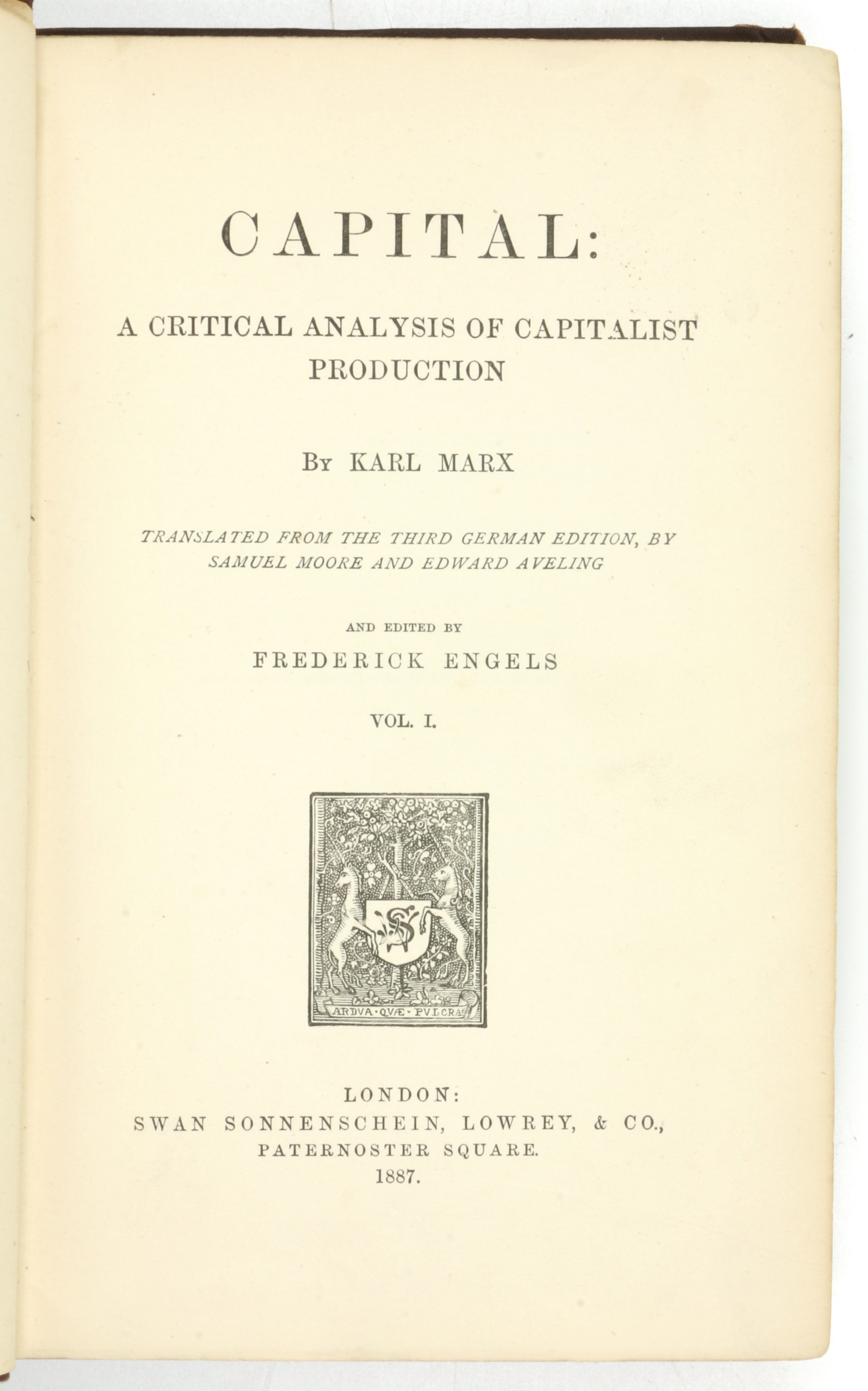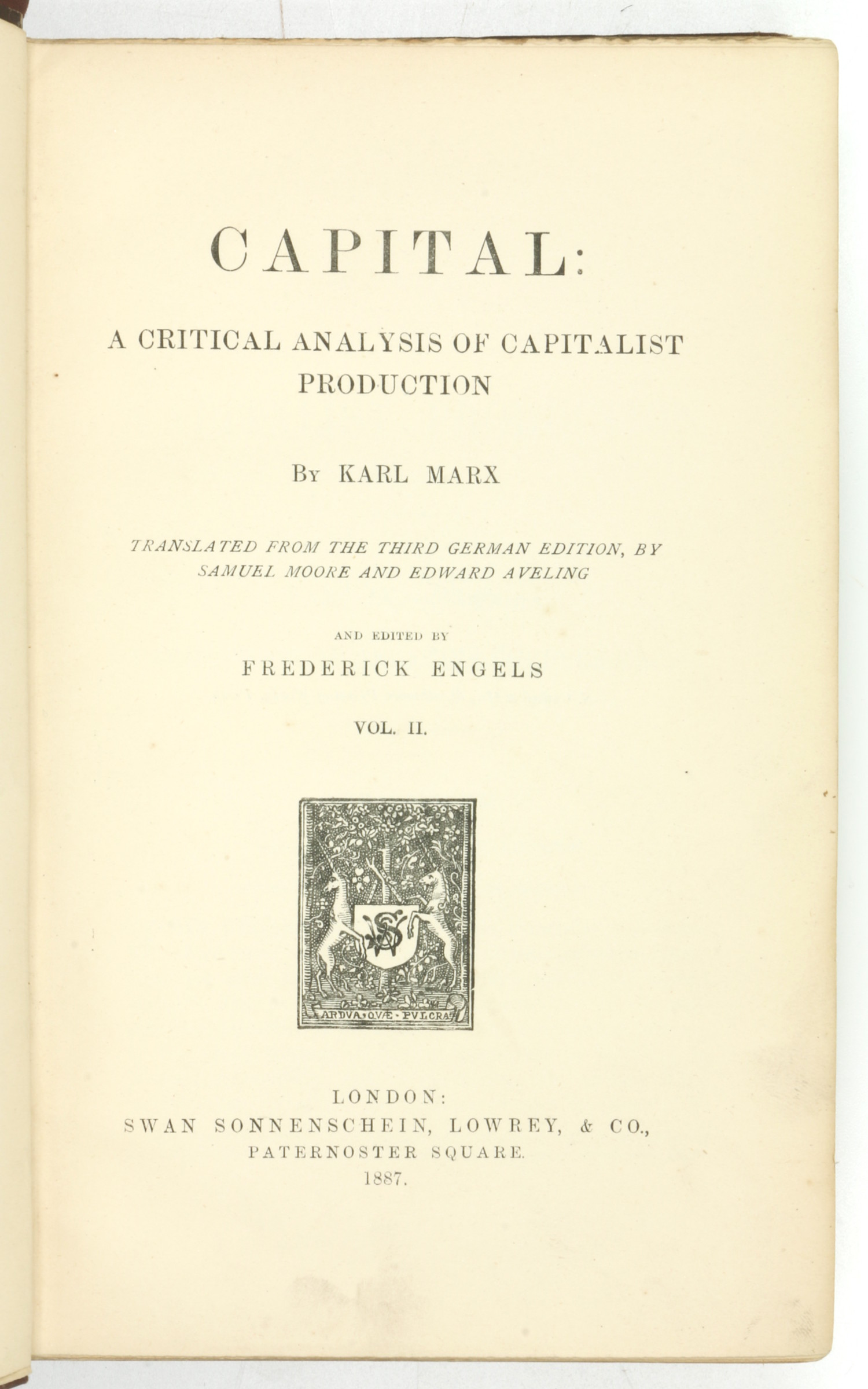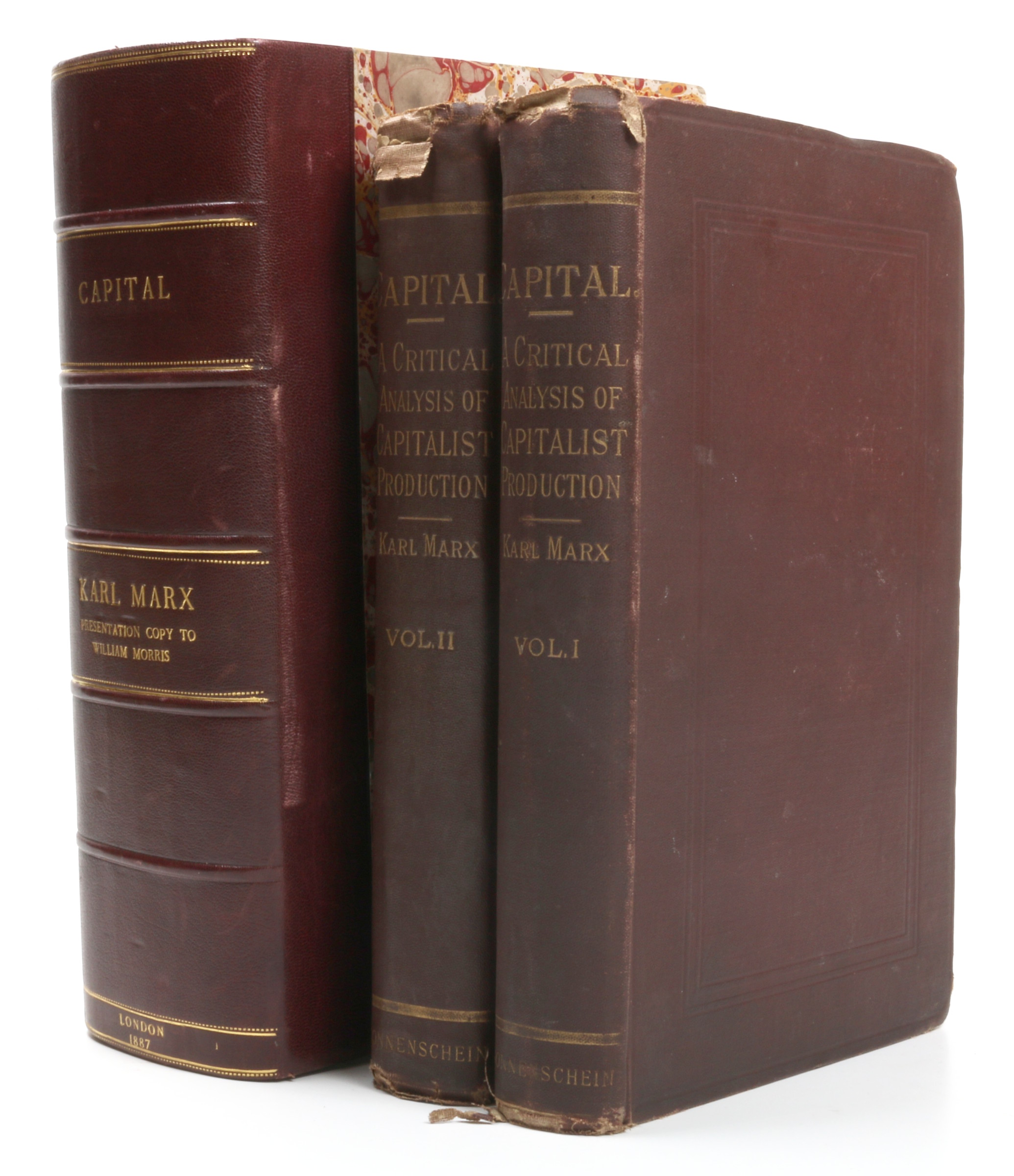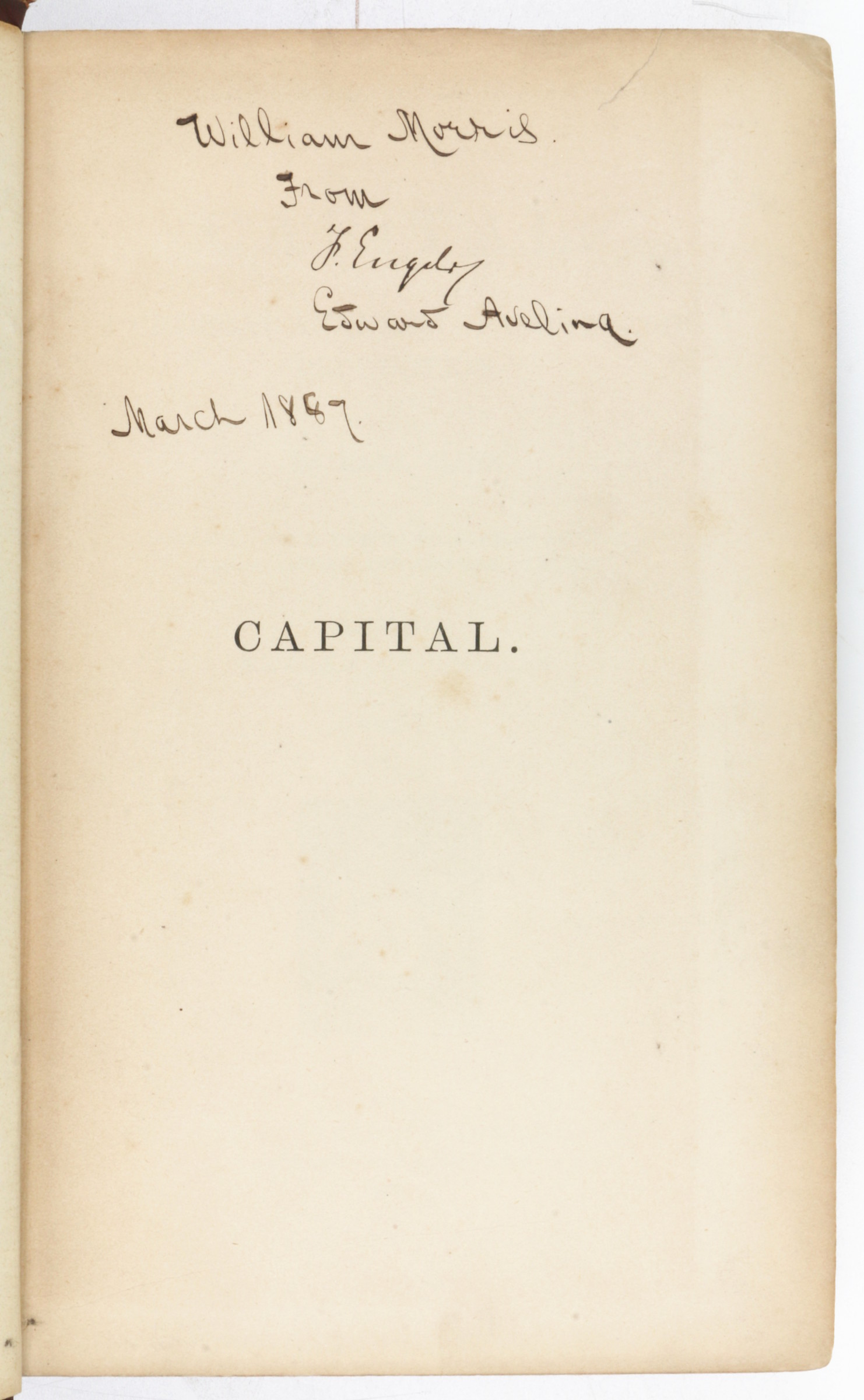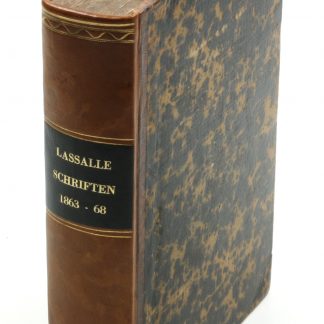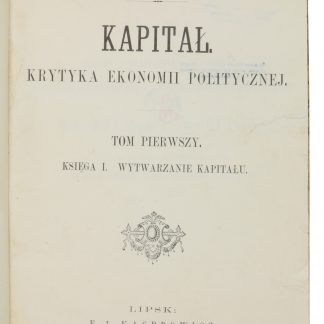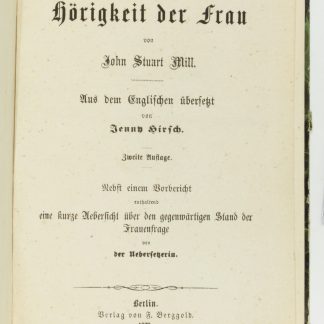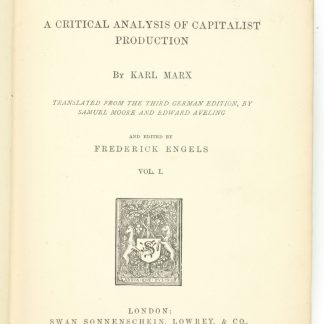Inscribed to William Morris by Engels and Aveling
Capital: A Critical Analysis of Capitalist Production. Translated from the third German edition, by Samuel Moore and Edward Aveling and edited by Frederick Engels.
2 volumes, octavo. Original dark red cloth, spines ruled and lettered in gilt, covers panelled in blind, dark brown endpapers. Housed in a custom dark red morocco-backed book-form box with marbled paper sides and matching chemise. Continuously paginated between volumes. Engraved publisher's device to title pages. Pencilled marginal markers to pp. 145, 151, 155, 366, 374, 385, 473 (this with a neat two-word annotation, "*nationals (corruptions)"). Extremities worn, spine ends and corners bumped, the former professionally repaired, cloth cockled in places with a few shallow knocks to upper edges of covers, spine of vol. 2 somewhat flattened; expertly relined and recased, securing free endpapers; internally clean with the occasional minor spot or finger smudge, short closed tear to upper edge of vol. 1 half-title not touching the inscription. Overall a good copy, its condition indicative of the thorough manner in which Morris read "Kapital".
€ 325,000.00
A superb presentation copy of the first edition in English of "Das Kapital", inscribed by Edward Aveling in ink on the half-title of the first volume, "William Morris from [F. Engels] Edward Aveling March 1887", with Engels signing his name in his own hand. This is the first issue, one of 500 copies printed, gifted to Morris in the month that the first edition sold out.
The artist-craftsman William Morris (1834-1896) embraced Marxism during the period 1878-96 to become a committed libertarian socialist. Before this time "he had 'never so much as opened Adam Smith, or heard of Ricardo, or of Karl Marx'. He began to remedy this by reading "Das Kapital", in the French version, in the early months of 1882... He did not find Marx easy. He later confessed that though he thoroughly enjoyed the historical sections, the chapters on pure economics caused him 'agonies of confusion of the brain'... But he persevered, and the following year was still carving out time from his onerous lecture tours and Socialist committees to study Marx's theories of work and wages" (MacCarthy, pp. 467-8). In January 1883 Morris joined Henry Mayers Hyndman's Social Democratic Federation (SDF) - Hyndman's "England for All" (1881), dismissed by Marx and Engels for its blatant plagiarism of parts of "Das Kapital", was nevertheless a key text in the formation of English socialism. After two years of membership Morris seceded from the group in December 1884 to found the Socialist League alongside Eleanor Marx (also a close friend of his daughter May), Edward Aveling, and Belfort Bax. He continued to work to disseminate Marx's message, including by arranging and introducing Aveling's weekly lecture series on "Kapital", which ran from February to June 1885. The lectures were published concurrently in the League's organ, "The Commonweal", of which Morris was editor and Aveling sub-editor.
Draper notes that Engels met regularly with the new group, and otherwise kept in touch via Eleanor and Aveling. Engels was supportive of their decision to split from the SDF, but remained critical of Morris's leadership and lean towards anarchism. Engels's biographers note that "although he recognized the goodwill of a man like William Morris, he kept away from the League, which later became tainted with anarchist ideas" (Mayer, p. 272). By May 1887 Engels wrote to Friedrich Sorge that "the anarchists must be expelled or we'll drop the whole mess" (quoted in Henderson, p. 681). Nevertheless, Engels continued to contribute various articles to"Commonweal"; his piece entitled "How Not to Translate Marx", for example, was published in November 1885.
When Moore and Aveling's English translation of "Capital" was published in January 1887, Morris was busy delivering numerous lectures in London, Norwich, and Merton, as well as beginning his short-lived "Socialist Diary" (see "The William Morris Chronology"). The inscription in this copy is dated March 1887, the month by which the first edition had almost entirely sold out (see below for further details). On 26 September, in a letter to an unknown recipient, Morris recommended that "you should read Marx's 'Capital' translated now & published by Sonnenschein" (letter no. 1406 p. 695).
Despite the differences that grew between Morris and Engels, the former remained faithful to Marxism and clearly prized "Kapital", a text which Morris had diligently struggled through, first in French and then English. One of T. J. Cobden-Sanderson's earliest commissions was Morris's personal copy of the French edition, which "'had been worn to loose sections by his own constant study of it'. He bound the book in a deep turquoise leather with elaborate gilt tooled decoration of buds and spots and stars" (MacCarthy, p. 592). The rear cover was lettered "William Morris and his Friends, 1884" within a gilt wreath; a later note from the binder to the rear flyleaf states: "This Book - Le Capital - was bound and tooled for William Morris by me in my first workshop in Maiden Lane, 1884, and finished the 9th October, and the pattern on its sides and back is the Second of my making. The tools were second hand and bought and used at haphazard, but the tooling and binding pleased William Morris and his pleasure was my own great delight. In Memoriam I write this the 24th February, 1897 - T. J. Cobden-Sanderson". Morris's "Le Capital" sold at Sotheby's in 1932 (lot 31, £62 to Maggs). It is the only other copy of Marx' magnum opus, in any iteration, that we can trace in commerce with an association with Morris, making the present twice-inscribed copy of the first English edition a remarkable survival. This is even more true considering that it is also, to our knowledge, the only English "Capita" to have appeared inscribed on the market.
Of the English translation itself: Samuel Moore, a lawyer and translator active in the Manchester IWMA, was engaged by Engels to provide an English translation of "Kapital", which, as a close friend of both Marx and Engels, he had studied since its publication. Moore was joined in this project by Edward Aveling in 1884, the same year that Aveling began his relationship with Marx's daughter, Eleanor. Using the text of the third German edition of book I, Moore and Aveling's translation took into account the substantial changes which Marx made for the French translation, published in livraisons between September 1872 and November 1875. Although book II of "Kapital" had already been published in 1885, Engels explained the reasoning behind translating just the first book in his preface to the present edition, saying that a translation of it without book III would be incomplete. The German edition of book III did not appear until 1894.
Moore and Aveling's translation was published, with Engels's approval, in January 1887. Draper notes that by early March "the first edition of the English translation has sold all but about 50 copies, almost half in America; a second printing is in preparation" (Register 1887/18). Sraffa notes that "a reprint was issued in the same year, recognisable because it does not have the half title to vol. II, and has no imprint on p. 800", and a cheaper single-volume stereotype edition was printed in 500 copies in April. The English translations of book II and III followed in 1907 and 1909 respectively. All subsequent English editions were based on this "authorized edition": it remained the standard text for the English-speaking public, and continued to be revised and republished until the 1950s.
Die Erstdrucke der Werke von Marx und Engels, p. 33. Draper M129 & ST/M5. Rubel 633. Sraffa 3873. W. O. Henderson, The Life of Friedrich Engels, vol. 2, 1976; Norman Kelvin, ed., The Collected Letters of William Morris, vol. 11, 1987. Fiona MacCarthy, William Morris, 1995; Gustav Mayer, Friedrich Engels: A Biography, 1969; Nicholas Salmon, The William Morris Chronology, 1996.

